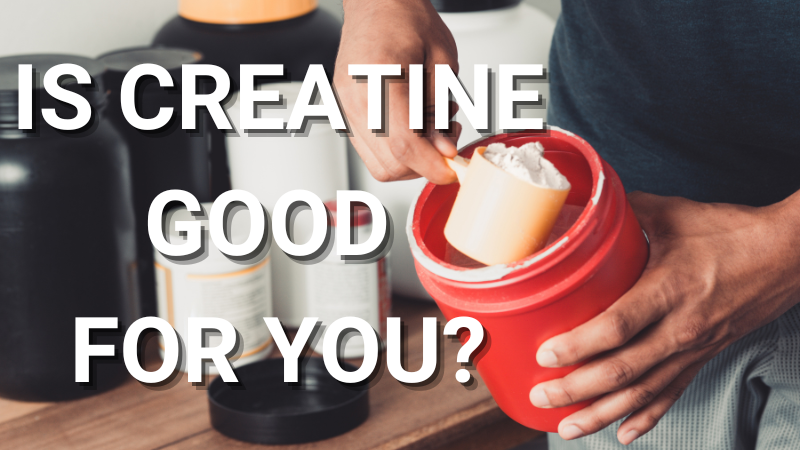
Recently I interviewed Professor Darren Candow, a renowned expert in the field of creatine research. What I learned has changed my thoughts on this cheap and highly accessible supplement as I age and it is now part of my everyday routine. Spoiler alert…it’s not just for young people….
What is Creatine?
Creatine is a natural compound that is produced in our bodies, primarily in the kidneys, liver, and brain. It is made up of three amino acids and is found in higher concentrations in animal-based protein sources such as red meat, seafood, and poultry. While our bodies naturally produce creatine, we can also consume it through certain food sources or as a dietary supplement. One of the best-known functions of creatine is its ability to maintain energy within our cells, particularly during activities that require bursts of energy, such as weight training or high-intensity exercises. It helps to replenish ATP (adenosine triphosphate), the energy currency of our cells, allowing us to perform more intensely and for longer durations. This is why many athletes take creatine to enhance their performance, as it is known to increase energy capacity and improve recovery.
Creatine as a Supplement
When it comes to creatine supplementation, the most commonly recommended and studied form is creatine monohydrate and this form of creatine has been shown to be safe and effective. Other forms of creatine have not been proven to be more effective than creatine monohydrate. It is important to note that creatine supplements are typically vegan-based and do not contain any animal products. However, it is always advisable to check the label for third-party testing and certification to ensure the safety and quality of the product, especially for athletes who may be subject to doping regulations.
Common and Surprising Benefits of Creatine
Creatine has long been associated with increased muscle performance, I even remember having some back in the mid-90s thinking I was going to get super muscular if I ate it…Turns out you actually need to lift some weights as well! When you do creatine has been shown to improve muscle mass, strength, endurance, and power. It allows individuals to exercise more intensely and for longer durations, leading to greater gains in muscle strength and size. However, more recently studies have also shown that creatine supplementation can benefit older adults by improving muscle performance, even without exercise. This is particularly important as we age and naturally experience muscle loss. Creatine has been shown to preserve and enhance muscle function in older adults, reducing the risk of falls and fractures. For a simple supplement that you can put in your water in the morning, that’s pretty impressive.
Emerging research suggests that creatine may have cognitive-enhancing effects (1), especially in individuals whose brains are metabolically stressed. This means that supplementing with creatine during periods of stress, such as sleep deprivation, jet lag, hypoxia, or aging, has been shown to improve memory, and cognition, and reduce symptoms of sleep deprivation. Creatine has also shown promise in improving symptoms of depression and anxiety when used as an adjunct therapy. While it is important to note that creatine should not replace medication or therapy for mental health conditions, it may provide additional benefits when used alongside traditional treatment methods.
One area that Dr. Candow was very interested in studying was the potential benefits of creatine on bone health, particularly in postmenopausal women. He noted that creatine supplementation when combined with exercise, has been shown to reduce bone mineral loss, improve bone strength, and potentially decrease the risk of fractures. This is especially significant as bone health becomes a growing concern with age, particularly in women at increased risk of osteoporosis.
A new area of interest is the potential use of creatine in the management of long COVID and traumatic brain injuries. Research has shown that creatine may help to decrease inflammation and oxidative stress in the brain (2), potentially aiding in recovery and cognitive function. While more studies are needed in these areas, early findings suggest that creatine could have beneficial effects on individuals recovering from brain-related conditions. This actually ties in nicely with what Dr. Perry Maynard and Dr Tommy Wood mentioned during my interview with them.
Myths and Safety Concerns
There are several common myths and safety concerns surrounding creatine that need to be addressed.
Contrary to popular belief, creatine supplementation has not been directly linked to hair loss. The misconception originated from a study that showed an increase in a hormone called DHT, which is associated with hair follicle loss (3). However, the study did not demonstrate any hair loss or thinning. There is no direct evidence to suggest that creatine causes hair loss.
Creatine supplementation does not lead to increased fat mass. In fact, studies have shown that it can actually decrease body fat percentage, although the effect is minimal. The temporary weight gain observed during the loading phase of creatine supplementation is mainly due to water retention, not increased fat mass.
Extensive research (3) has shown that creatine supplementation does not cause any adverse effects on kidney or liver function in healthy individuals. It is important to note that individuals with pre-existing kidney or liver conditions should consult their healthcare provider before taking creatine. For the general population, creatine has been proven to be safe and effective.
Dosing and Recommendations
The recommended daily dose of creatine varies depending on the individual and their specific goals. For general health and exercise performance, a daily dose of 3-5 grams of creatine monohydrate is sufficient for most individuals, this is what I take. This can be increased to 8-10 grams for older adults or individuals with specific health conditions. It is recommended to start with a lower dose and gradually increase it to assess tolerance and response. Creatine supplementation can be taken as a single dose or divided into smaller doses throughout the day. It can be consumed with food or mixed with other beverages for convenience. While the loading phase, which involves taking a higher dose for a short period, may not be necessary for most individuals, it may be beneficial for elite athletes or individuals with specific performance goals. However, it is important to note that the loading phase can lead to temporary weight gain due to water retention.
Next Steps
Creatine is a natural compound that offers numerous benefits for health and performance. It has been extensively studied and proven to be safe and effective when used appropriately. From improving muscle performance and cognitive function to supporting bone health and recovery from brain-related conditions, creatine has the potential to enhance overall well-being. While creatine supplementation is not essential for everyone, it can be a valuable tool for individuals looking to optimize their health and performance. As with any supplement, it is important to consult with a healthcare professional before starting creatine, especially for individuals with pre-existing medical conditions. Creatine is just one piece of the puzzle when it comes to achieving optimal health and performance. Incorporating a well-rounded approach that includes regular exercise, a balanced diet, and other lifestyle factors is key to maximizing the benefits of creatine and maintaining overall well-being.
Sources:

Over the last 10 years Ed has been building a YouTube library to help people manage their own pain or movement limitations and increase performance through exercise. He regularly adds videos so be sure to subscribe and visit regularly


"Oh My Gosh- I am ALREADY feeling relief after a few days! I used to wake up 2-3 times a night with shooting pain that anti inflammatories couldn't touch. Now I have been waking up just because I want to notice what it feels like to lay in bed pain free- THANK YOU!."

"When I first started with your program I was experience a lot of pain. Walking was difficult. I had to stop and catch my breath every few minutes and lean against a wall for support. Now when I walk with my husband we go for over an hour. I never had to sit down and stop...and, hardly any pain!!! 😊😊 I can’t thank you enough."
Frustrated that you aren't recovering fast enough?
Discover how to heal from illness and injury using movement, food and lifestyle.